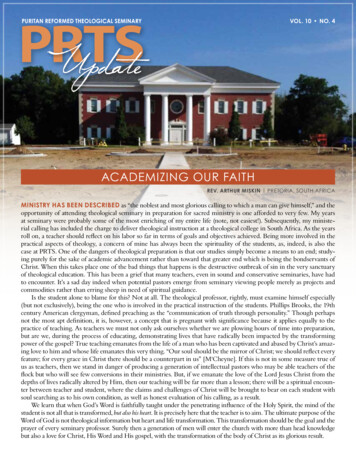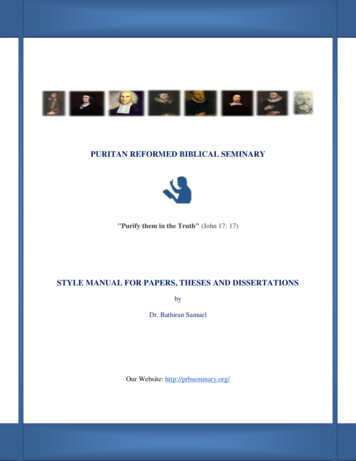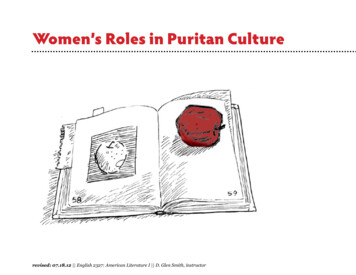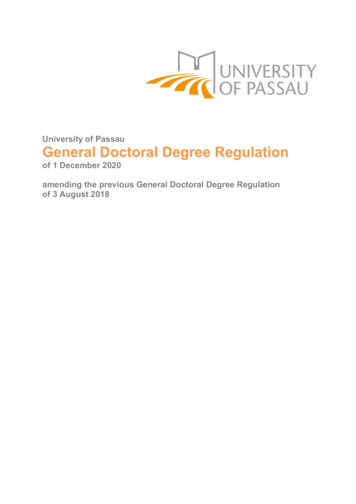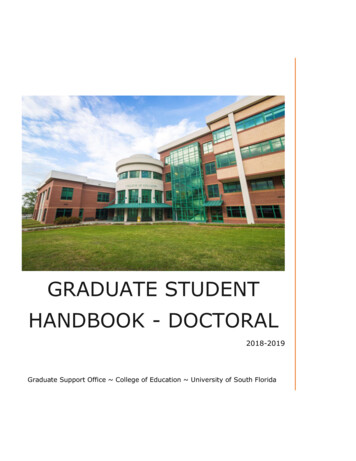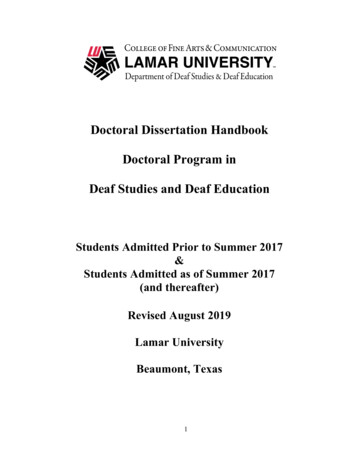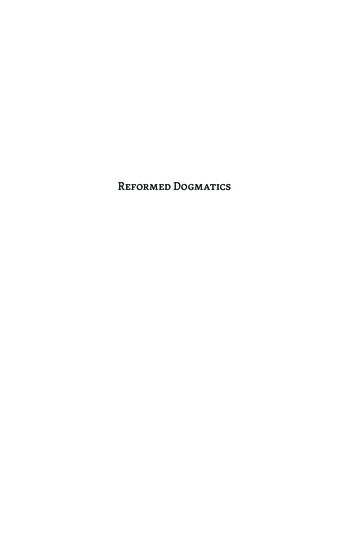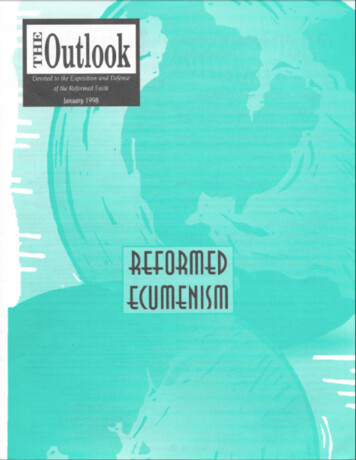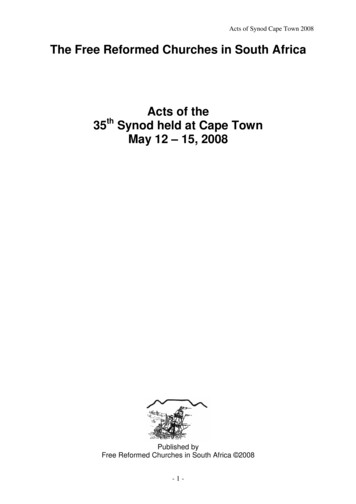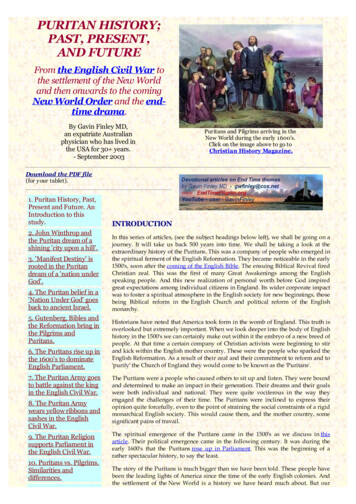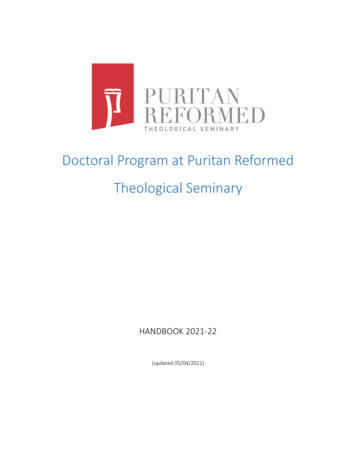
Transcription
Doctoral Program at Puritan ReformedTheological SeminaryHANDBOOK 2021-22(updated 05/04/2021)
Table of ContentsDoctoral Program at Puritan Reformed Theological Seminary . 1DISCLAIMERS . 4Welcome from the President . 5Welcome from the Doctoral Program Director . 6General Description . 7Program Objectives. 8Program Goal. 9Assessment of Program Goals . 9Admission Requirements. 11Tuition and Fees . 12Doctoral Student Agreement. 13Program Resources . 13Community of Learners . 14Affiliated Institutions for Research and Education. 14Affiliated Research Institutions . 14Affiliated Institutions Where External Courses May Be Taken . 15Program Planning . 15Course Requirements and Residency Requirement . 16Courses that may be taken from a distance . 17PhD in Biblical Studies . 17PhD in Historical Theology . 18PhD in Systematic Theology . 19Teaching and Preaching Requirements . 20Teaching . 20Preaching . 20Examinations and Progress in Program . 20Course work. 20Evaluation of Teaching. 212
Evaluation of Preaching . 21Research Language Requirements/Exams . 21Comprehensive examination . 22Time Limit for Degree Completion (Statute of Limitations) . 22Degree Candidacy and Dissertation Proposal . 22Dissertation Requirements . 23Dissertation Defense . 23Graduation Requirements . 24Commencement and Academic Regalia . 24Dissertation Final . 24Dissertation Publication . 24APPENDIX A. 25APPENDIX B . 26APPENDIX C . 27APPENDIX D. 28APPENDIX E . 29APPENDIX F . 31APPENDIX G . 37APPENDIX H . 42APPENDIX I . 43APPENDIX J . 443
DISCLAIMERSThis handbook includes policies and procedures pertinent to the doctoral program at Puritan ReformedTheological Seminary. Prospective and registered students should consult the handbook throughout theadmission process and their study. Please visit r the most recent edition of the handbook.This handbook is not an agreement or an offer of admission to the program, and Puritan ReformedTheological Seminary reserves the right to change or correct any material in this handbook4
Welcome from the PresidentA seminary is a center where called students are trained for faithful ministry in Christ’s church (2 Tim.2:2). It is to be an arm of the church of Jesus Christ, outfitting its students for ministry throughout theworld (Matt. 28:18-20). The gospel alone is the hope of our perishing world. We believe that God, by HisSpirit, will use the theological education of qualified spiritual leaders to enliven His people, save the lost,and glorify His name with faith that overcomes the world.Puritan Reformed Theological Seminary strives to be a catalyst for defining, inspiring, promoting,and defending the Christian faith around the globe through its graduates and faculty. The world needsfaith that is based on Scripture, self-denying and serving, and openly dependent on God’s sovereigngrace. By such faith, Jesus Christ is imaged and God’s glory is transcribed in the world.The need for faithful ministry in the academy and church is great, as are the opportunities.Moreover, no vocation on this side of heaven is as privileged or rewarding as Christian ministry. God hasgranted PRTS many blessings, including God-fearing instructors and students who have much love for Godand each other. We are grateful for a student body of diverse backgrounds and denominations, seekingto glorify God by promoting His kingdom. The biblical, doctrinal, experiential, and relevant Reformed faithwe strive to promote in every classroom builds a solid foundation for ministry today.We are delighted that you have chosen to undertake the doctoral program with us, and hopethat your time of study is intellectually challenging and stimulating, as well as spiritually enriching.If you feel called by God to pursue a doctoral study and are looking for training that combinessolid Reformed and classical theology with robust, biblical piety, our program may be exactly what youare looking for! We hope you will seriously consider Puritan Reformed Theological Seminary as the placeto prepare you, with the Spirit’s blessing, for a life of Christ-centered service.May God guide you and us in His way and, if it is His will, cause our paths to cross in several yearsof fruitful fellowship.Warmly,Dr. Joel R. Beeke, President5
Welcome from the Doctoral Program DirectorWelcome to the doctoral program of Puritan Reformed Theological Seminary. Foundational to ourdoctoral program is the academic and spiritual formation of the student. Our fully-funded doctoralprogram is designed to meet the widespread demand for a comprehensive doctoral program thatcaptures academic rigor and integrity, combining this with biblical piety (de pietate cum scientiaconjungenda)—in other words, a doctoral program designed to serve the ministry of both the academyand the church (teaching and preaching). The doctoral program of Puritan Reformed TheologicalSeminary is served by a faculty specifically appointed for the program, and internationally supported byleading scholars who are academically recognized and gifted in serving the church of Christ worldwide.Your supervisors will work closely with you in your academic formation—advising you in yourcourse work, dissertation research topic, teaching, and publications—as well as in your spiritualformation—guiding you in your preaching and in the reading of classic works on spiritualty and piety.Our program is internationally oriented in terms of research, education, and publication, but italso pays attention to the local and regional needs identified by you (the student) and the faculty in orderto do meaningful and relevant doctoral work.You are able to choose one of three emphases offered in the doctoral program: (1) BiblicalStudies, (2) Historical Theology (Reformation and Post-reformation), and (3) Systematic Theology. Theseareas of research, education, and publication, due to the combined academic and spiritual emphasisdistinctive, are distinctive of Puritan Reformed Theological Seminary, through which we aim to serve theglobal church and academy.Our hope and prayer is that you are stimulated academically and enriched spiritually to serveChrist and His church in this world.Warmly,Adriaan C. Neele, PhD, Director of Doctoral Program6
General DescriptionIn preparing students to serve Christ and His church through biblical, experiential, and practical ministry,Puritan Reformed Theological Seminary (hereafter PRTS) offers an accredited and internationallyrecognized doctoral program. This handbook considers the rationale, requirements, and envisionedresults for the Doctor of Philosophy (hereafter PhD) program.Foundational for the doctoral program is the rationale behind the emphasis on both the academicand spiritual formation of the student. A worldwide demand is growing for a comprehensive doctoralprogram that captures academic rigor and integrity, and combines this with biblical piety (de pietate cumscientia conjungenda). In other words, it is necessary that a doctoral program serve the ministry of boththe academy and church (teaching and preaching). This growing demand is not only identified in NorthAmerica, but also throughout the world by those who appreciate the biblical and Reformed doctrines,and desire experiential preaching and teaching.PRTS seeks to adhere to the Reformed and Puritan tradition of learning together with piety,exemplified by John Calvin, William Perkins, William Ames, Gisbertus Voetius, Archibald Alexander, andmany others. We aim to do so by offering a fully-funded doctoral program that is distinctive in itsacademics and biblical piety; this will be evident in the admissions requirements, as well as the program’sacademic rigor and spiritual formation components.The doctoral program will be academically rigorous as we offer a comprehensive program with high,measurable, and internationally peer-reviewed and accredited academic standards. The academics of theprogram are further enhanced by: 1) PRTS-approved and qualified Adjunct Faculty for the doctoralprogram serving as subject experts and co-advisors for the doctoral student; 2) external courses takenoutside of PRTS by the doctoral student; 3) a world-class web-based platform of primary and secondarysources offered through the Puritan Research Center and its worldwide affiliated centers; and 4)publication of the doctoral dissertation with an academic and internationally-recognized publishinghouse.The spiritual components of the doctoral program consist of assigned readings and experientialpreaching (in theory and practice) or practical teaching ministry. Resonating with the Reformed andPuritan tradition of international learning, PRTS’s doctoral program desires a vibrant internationaldimension that couples academic excellence and spiritual richness.7
Key to PRTS’s doctoral program is its well-built technology component that offers digitalized primaryand secondary sources for research, smart-room(s) designed for distance education, and the deploymentof digital writing tools for publication. Indeed, technology is integral to the doctoral program as it takesthe classroom to the (non)-residential student with the aim of a more effective transfer and exchange ofknowledge. Thus, the doctoral program involves a hybrid or blended-learning environment that includesin-class contact sessions (on campus or online) and online-only sessions.Through this doctoral program, PRTS envisions the formation of pastor-scholars and scholar-pastors.The pastor-scholar is enabled to serve the church with academic integrity striving to accurately andeffectively communicate the transformative truth of Scripture, as well as addressing the challenges of themodern world. The scholar-pastor is enabled to serve the academy with pastoral integrity to accuratelyand effectively communicate historical theology, systematic theology, or biblical studies, as well asaddressing the demands of high standards of scholarship. Both the pastor-scholar and scholar-pastor arereflective practitioners.PRTS seeks to address, without compromising its academic standards and spiritual focus, thefinancial challenges that often accompany a graduate degree. PRTS addresses this challenge in asustainable way by: 1) delivering educational content, as much as possible, through technology; 2)reducing residential requirements; and 3) offering a fully-funded degree program.Program ObjectivesIn preparing students to serve Christ and His church through biblical, experiential, and practical ministry,the doctoral program of PRTS prepares students to serve in the academy and church through: Piety, Preaching, and Publications: Throughout the program students are challenged to grow in theirspirituality, and seek a healthy balance between academics and spiritual life; students called to apreaching ministry participate in a homiletics practicum to foster biblical and experiential preaching;and students are encouraged to engage in writing ministry during and upon completion of theirstudies. This writing ministry unfolds in three ways: publications in scholarly peer-reviewed journals,publications for the edification of the church, and publications designed to instruct the unsaved in askeptical world. Moreover, the writing of a doctoral thesis keeps in mind a potential monograph forpublication.8
Research and Reformed: Students demonstrate an advanced competency in theology—in particularReformed theology—and mastery of relevant primary and secondary sources in one of the followingdisciplines: Historical Theology, Systematic Theology, or Biblical Studies. Students must demonstrate acomprehensive knowledge of Reformed intellectual trajectories and traditions. Technology and Teaching: Students demonstrate an advanced level use of digital sources,deployment of writing tools, and a God-honoring use of technology, internet, and social media for thedissemination of biblical, experiential, and practical thoughts. Students called to a teaching ministryparticipate in a teaching practicum. Scholarship (academics) and Scholarships (financial): Students are able to engage in internationalscholarly discourse that demonstrates independent inquiry, primary source research, criticalreflection, analysis, and articulation of academic research. Students are also financially supported asthe program is fully-funded.Program GoalThe over-arching goal of the doctoral program is the academic and spiritual formation of each doctoralstudent so as to enable him or her to serve the academy and the church with academic integrity andbiblical piety. This is expressed in the three subsidiary goals of: 1) Academic and Spiritual Formation; 2)Formation in Research; and 3) Formation in Ministry.Assessment of Program GoalsProgram goals / outcome 1: Academic and Spiritual formationAssessment of PhD student goal / outcome 1: Coursework assessment, and teaching and preaching evaluation. Comprehensive examination assessing depth, breadth, and integration of knowledge. Review by members of faculty, supervisor, and advisor of the academic work and spiritualwell-being of student. A cap-stone project on spiritual formation.Role of PRTS and Doctoral Program in assisting students to achieve goal / outcome 1:9
Provide research, education, and administrative resources. Provide resources for spiritual formation. Periodic assessment of teaching effectiveness of faculty, and other appointed instructors. Periodic review of curriculum and course offerings by:oDoctoral program management, faculty (internal), and academic advisors (external).oDoctoral students.Program goals / outcome 2: Formation in ResearchAssessment of PhD student goal / outcome 1: Coursework assessment depth, breadth, and integration of knowledge. Research Methodology and Dissertation Proposal course. Advanced research and education with digital resources. International engagement of scholarly work through participation of conferences, lectures,and publication of peer-reviewed articles. Preparation, examination, and defense of PhD dissertation. Publication of dissertation or peer-reviewed articles based on dissertation withinternational academic publishers within two years of completion of study.Role of PRTS and Doctoral Program in assisting students to achieve goal / outcome 2: Offer early introduction to advanced research methodologies. Offer participation in PRTS research projects and PRTS conferences. Offer regular opportunities to present readings, research, and provide feedback. Regular scheduled meetings with program director, supervisor, and advisor. Assist student in obtaining research and travel grants.Program goals / outcome 3: Formation in MinistryAssessment of PhD student goal / outcome 3: Teaching or Preaching practicum and effectiveness. General presentation and communication skills. Effective communication of academic and research knowledge to scholarly audience.10
Effective communication of academic and research knowledge to laypeople audience.Role of PRTS and Doctoral Program in assisting students to achieve goal / outcome 3: Offer opportunity to teach and / or preach. Offer participation in PRTS speaking engagements. Regular scheduled meetings with program director, supervisor, and advisor. Assist students in obtaining teaching and / or preaching opportunities in churches.Admission RequirementsA second graduate degree in theology, such as an accredited ThM, MTh, or STM, is preferred foradmission to the program. Exceptionally gifted students may be accepted into the program having anaccredited MDiv, or first graduate degree in theology, such as an MA or MTS. Comparable degrees frominstitutions within or outside North America may be accepted provided schools can demonstrate thatthey meet the standards of the ATS Board-approved degrees for admission. Students with a first graduatedegree in theology may also apply for the ThM (Master of Theology) program, and then apply for the PhDprogram after successful completion of three (3) ThM-level courses with a minimum GPA of 3.50.To be eligible for admission to the doctoral program, the applicant must: be called to the ministry of teaching and/or preaching. demonstrate high potential for local and regional influence through (future) ministry of teaching andpreaching after completion of studies. preferably posses a second master’s degree in theology from an accredited institute of higherlearning, or in exceptional cases, a first master’s degree in theology from an accredited institute ofhigher learning. For applicants to the Biblical Studies emphasis only, have a minimum of six (6) credits of Hebrew, anda minimum of six (6) credits of Greek. An entrance proficiency test for Greek and Hebrew language ispart of the admission process for doctoral students in the Biblical Studies emphasis, and includes atranslation of a minimum of 500 words in two (2) hours with a minimum of eighty (80) percentaccuracy. For additional language requirements during the PhD program, please see the relevantsection below.11
have teaching and / or preaching experience. adhere to the Three Forms of Unity and/or Westminster Standards (apart from a position on paedoor credobaptism). demonstrate biblical piety and character.It is recommended that applications for admission to the doctoral program be submitted no later thanApril 30 (for a fall-semester start) or October 30 (for a spring-semester start). The applicant will beinformed about the decision of the Admissions Committee by the Director of Admissions shortly after adecision has been made. The Admissions Committee meets on a rolling basis approximately every twomonths. Applications are considered at the next available meeting only when all application componentshave been received.The applicant must: have had an interview with the President, Program Director, or Director of Admissions. submit official and certified transcripts of all post-secondary education (demonstrating the possessionof an undergraduate degree and at least a first master’s degree in theology). have an academic record with a Grade Point Average (GPA) of 3.50 or higher (or its equivalent). submit a Graduate Record Examination (GRE) score of 158 or higher in the Verbal and Quantitativesections, and 5.0 or higher in the Analytical Writing component. submit a recent CV (curriculum vitae). submit a copy of a completed master’s degree thesis or major research paper. submit a three-page preliminary dissertation proposal (see Appendix A), or choose one of thesuggested topics by the doctoral faculty. submit two academic references and one ecclesiastical references (see online application for details).Tuition and FeesNon-refundable application for admission 50Late registration fee per course 50Graduation fee 25012
The doctoral program is fully-funded. All doctoral-level classes and projects taught at PRTS are fullycovered if admitted to the program; the required two external PhD courses, however, are at the expenseof the student. Courses taken for credit or audit that are not doctoral-level classes, will be assessed theregular tuition rate.Doctoral Student AgreementApplicants admitted to the PRTS fully-funded doctoral program are required to sign a Doctoral StudiesAgreement (see Appendix I).Program Resources Since its inception, the William Perkins Library at PRTS has grown to its present state in support of thedoctoral program. The library particularly specializes on Puritan and Reformed primary and secondaryresources. The Puritan Research Center (PRC), which houses one of the world’s most extensive collection ofPuritan resources, is the culmination of a dream that is decades old and offers exciting possibilities forpromoting the appreciation of Reformed and Puritan literature around the world. The PRC’s aim is toassemble the largest possible collection of (digital) resources on the Puritans, including antiquarianbooks (mostly from the seventeenth century) and modern reprints of Puritan writings, as well assecondary source materials on the Puritans such as books, dissertations, and articles. The PRC alsohosts a Torah scroll, an unvocalized Ashkenazi text from a synagogue in Romania dating to the late 19thcentury and measuring over 125 feet long. Puritan Studies Index (PSI): The PSI allows students to search through the Puritan studies collection ofarticles, reviews, and other documents. These printed materials are located in the Puritan ResearchCenter (PRC) and organized by author’s last name. Articles may be photocopied. Students are encouraged to contact the librarian regarding other print and digital resources (such asATLA, EEBO, EBSCO, EAI, and others). For doctoral students on campus a research carrel will be assigned for each academic year; visitingdoctoral students may notify the library four weeks in advance to reserve a research carrel. Doctoral students (on or off campus) have library privileges accessible through a user login. Libraryresources (digital and non-digital resources such as books, e-books, primary and secondary sources13
via commercial and Open Access databases, journals, e-journals, and articles) can be attained in thisway. All available resources, electronically and otherwise, are catalogued and accessible athttps://prts.edu/library/. PRTS is committed to continue an aggressive acquisition of digital resources. The library IT infrastructure provides online chat and call functionality to make inquiries to the librarystaff. Upon request, and if required, the library staff will prepare digital scans of book pages andarticles, in accordance with Creative Common License regulations, and upload these into the librarysystem, making it available to registered users, or email the requested information to the doctoralstudents. A doctoral advisor is assigned in the first year of study.Community of LearnersStudents are encouraged to participate in the doctoral student learning community. The aim of thislearning community is to avoid the isolation of the individual doctoral student, and to encourage a vibrantcommunity of learners. This community will gather once a year on campus (see “Residency Requirement”section for details), will meet online through social media platforms, and will be connected by othermeans of communication. In addition, students will have regular phone, Skype, or FaceTime discussionswith their advisor and / or director of the doctoral program for academic and spiritual formation.Affiliated Institutions for Research and EducationThe doctoral program is designed to offer high quality scholarship supported by affiliated researchinstitutions who offer specific collections for research in Historical Theology (Reformation, Postreformation), Systematic Theology, and Biblical Studies. Affiliated educational institutions offer externalcourses for the doctoral program in these fields. PhD students are required to take at least two courseswith these institutions or another approved external institution.Affiliated Research InstitutionsAffiliated Research Institutions may include: The Congregational Library and Archives, Boston—for studies in New England Puritanism Jonathan Edwards Center at Yale University—for studies in New England Puritanism H. Meeter Center at Calvin College—for Reformation studies14
Andrew Fuller Center at Southern Baptist Theological Seminary—for studies in confessionalBaptists The Johannes à Lasco Library, Emden (Germany)—for Reformation studies The Institut für schweizerische Reformationsgeschichte der Universität Zürich (Switzerland)—for Reformation studies Home for Bible Translators and Scholars (Israel)—for language studies. Tyndale House, Cambridge (UK)—for Biblical Studies students, and upon request for HistoricalTheology.Affiliated Institutions Where External Courses May Be TakenThis may include: Asia: Hapdong Theological Seminary, South Korea; China Reformed Theological Seminary, Taiwan Europe: Evangelical Theological Facility, Leuven, Belgium; Pastors’ Academy, London, UK;Theological University Apeldoorn, the Netherlands; Free University Amsterdam, the Netherlands Middle East: Home for Bible Translators and Scholars, Jerusalem, Israel North America: Calvin Theological Seminary, Grand Rapids, MI; Greystone Theological Institute,PA; Jonathan Edwards Center at Yale University; Southern Baptist Theological Seminary, Louisville;Westminster Theological Seminary, Philadelphia, PA. South America: Andrew Jumper Graduate School at Mackenzie University, Saō Paolo; MartinBucer Seminary Brazil, Sao Jose dos CamposProgram PlanningIn order to facilitate your timely progress through the program, the Handbook of the Doctoral ProgramAppendix D “Suggested Outline for Completing the Doctoral Program in Six Years” articulates the programsequencing, residency, and other requirements, enabling the prospective student to see the pace andrequirements necessary for timely program completion within the six-year cycle. The Director of theDoctoral Program and / or Doctoral Advisor plans with each doctoral
Puritan Reformed Theological Seminary strives to be a catalyst for defining, inspiring, promoting, and defending the Christian faith around the globe through its graduates and faculty. The world needs faith that is based on Scripture, self-denying and serv ing, and openly dependent on God's sovereign
